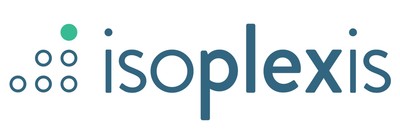IsoPlexis' Expanded Cell Therapy Offerings Demonstrated in Nature Medicine Publications
IsoPlexis Corporation (NASDAQ: ISO) announced the publication of two clinical studies in Nature Medicine showcasing the effectiveness of its single-cell proteomic platform in predicting the potency of CAR-T cells and tumor-infiltrating lymphocytes (TILs) in cancer treatments. The studies highlight the platform's ability to assess early indicators of response in cell therapies, enhancing understanding of immune drug functionality. Additionally, IsoPlexis expanded its functional cell library to include various engineered cell types, supporting advancements in the growing cell therapy market.
- Publications in Nature Medicine validate IsoPlexis' technology for predicting cell therapy efficacy.
- Expanded functional cell library includes diverse engineered cell types, enhancing market position.
- None.
Insights
Analyzing...
BRANFORD, Conn., Nov. 18, 2021 /PRNewswire/ -- IsoPlexis Corporation (NASDAQ: ISO), the leader in functional single-cell proteomics, today announced the publication of two high-impact clinical research studies in Nature Medicine. Both papers demonstrate the unique utility of IsoPlexis' single-cell proteomic platform for predicting the potency of novel cell therapies, including chimeric antigen receptor (CAR) T cells in blood cancer and tumor infiltrating lymphocytes (TILs) against solid tumors.
In addition, IsoPlexis has broadened its "functional cell library" of available workflows to cover vastly more engineered cell types to meet needs in the rapidly expanding cell therapy space. Other than autologous and allogeneic CAR-T cells and TILs, these include natural killer (NK) cells, T-cell receptor transgenic T cells (TCR-T), and various types of monocytes. The continued expansion of this library of proteomically-driven single cells provides the ability to characterize a comprehensive range of cell therapy product types to propel the fast-moving cell therapy industry.
"One of the greatest challenges in improving cell therapies is understanding exactly how these living immune drugs work, as early as possible. Through these two high-impact publications, the researchers leveraged our unique single-cell proteomic analysis to gain a better understanding of how CAR-Ts and TILs function, which then led to improved assessments of quality, potency, and durability," said Sean Mackay, CEO and co-founder of IsoPlexis.
Data from the company's single-cell functional proteomics platform was published in Nature Medicine by researchers from Stanford University. The paper, titled "CAR T cells with dual targeting of CD19 and CD22 in adult patients with recurrent or refractory B cell malignancies: a phase 1 trial," identifies early indicators of response or relapse in CAR-T therapy, leveraging IsoPlexis' platform. The researchers found that functional protein production from single cells is a meaningful attribute to predict the potency of CAR-T cell therapies. "Our results suggest that engineering iterations should be guided by careful studies of single-cell CAR polyfunctionality incorporating cytokine production as a critical quality attribute."
In another Nature Medicine paper titled "Tumor-infiltrating lymphocyte treatment for anti-PD-1-resistant metastatic lung cancer: a phase 1 trial", researchers from Duke University and Moffit Cancer Center published data on treatment response and potency in TIL therapy using IsoPlexis' single-cell functional proteomics platform. The platform's functional readouts were shown to be critical for understanding patient response to the novel TIL therapies. "We assessed the polyfunctional strength index (PSI), which is an indicator of the number of cells capable of secreting multiple types of cytokines. As PSI reflects the ability of a T cell to carry out multiple functions, it is recognized as a metric for the potency of cell therapy and for the efficacy of vaccines."
Visit our publications page to see the wide range of use cases for single-cell proteomics in accelerating a variety of cell therapies in high impact publications.
About IsoPlexis
IsoPlexis is leading a new era of functional proteomics. By identifying our most proteomically active single cells (or "superhero cells") for the first time, IsoPlexis enables researchers to connect more directly to in vivo biology and develop more precise and personalized therapies. IsoPlexis has been named Top Innovation or Design by The Scientist Magazine, Fierce, BIG Innovation, Red Dot and multiple others. The IsoPlexis platform is used globally by researchers, including those at the top 15 global pharmaceutical companies and at the majority of leading U.S. comprehensive cancer centers.
Cautionary Note Regarding Forward Looking Statements
Certain statements in this press release are forward-looking statements that are subject to risks and uncertainties that could cause results to be materially different than expectations. Important factors that could cause actual results to differ materially include: the rate of adoption of the Company's technology by its customers and potential customers as well as the risk factors set forth in the Risk Factors section of the Company's prospectus filed with the SEC. These forward-looking statements are not guarantees of future performance and speak only as of the date hereof, and, except as required by law, IsoPlexis disclaims any obligation to update these forward-looking statements to reflect future events or circumstances.
Investor Contact
investors@isoplexis.com
Press Contact
press@isoplexis.com
Related Links
www.isoplexis.com
![]() View original content to download multimedia:https://www.prnewswire.com/news-releases/isoplexis-expanded-cell-therapy-offerings-demonstrated-in-nature-medicine-publications-301427727.html
View original content to download multimedia:https://www.prnewswire.com/news-releases/isoplexis-expanded-cell-therapy-offerings-demonstrated-in-nature-medicine-publications-301427727.html
SOURCE IsoPlexis








